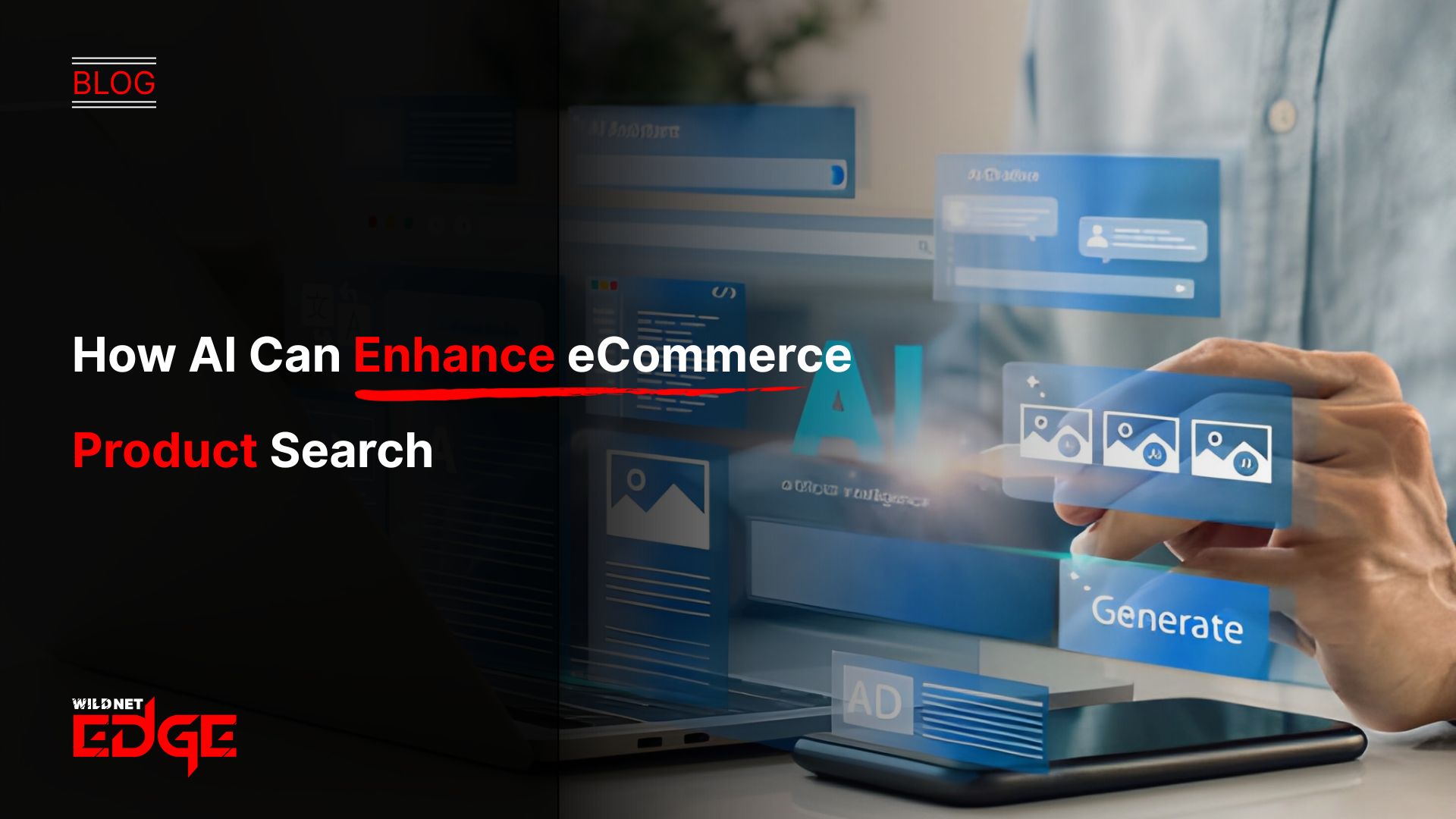TL;DR
This article explains how AI in ecommerce search transforms product discovery, moving beyond traditional keyword matching. It details how AI-driven search leverages Natural Language Processing to understand conversational queries and misspellings, and uses machine learning for personalization, showing results based on individual user behavior. Key benefits highlighted include significantly higher conversion rates, reduced site abandonment, and improved product discovery automation. Adopting AI in search is a critical strategy for online retailers to meet modern customer expectations and deliver a more intelligent, friction-free shopping experience.
For decades, the search bar has been the central gateway for eCommerce. Yet, it has been a source of frustration for just as long. A simple misspelling or a slightly vague query results in the dreaded “0 Results Found” page, leading to a bounced visitor and a lost sale. In 2025, this legacy approach is no longer tenable. The solution is AI in ecommerce search, a technology that transforms your search bar from a rigid, keyword-matching tool into an intelligent, conversational discovery engine.
Problem with Traditional Keyword Search
Traditional search functionality relies on a direct match between the user’s query and the keywords in your product titles or descriptions. This model is fundamentally flawed because it fails to understand human intent.
- It Fails on Typos: If a user searches for “suede sneakers,” a traditional search will likely fail.
- It Fails on Synonyms: Searching for “running shoes” might not show products described as “trainers.”
- It Fails on Natural Language: A query like “women’s street shoes with stripes” is too complex for basic search, even though the user has high purchase intent.
- It’s Impersonal: It shows every user the same results for that keyword, regardless of their past behavior or preferences.
This friction leads to high bounce rates and lost revenue. Data shows a significant percentage of shoppers will leave a site immediately if they can’t find what they need.
How AI-Driven Search Solves These Problems
AI-driven search technologies, particularly Natural Language Processing and machine learning, are designed to understand meaning and intent, not just keywords. This is the core of product discovery automation and the foundation of AI in ecommerce search.
Understanding Natural Language
NLP allows the search engine to understand conversational queries like a human would.
- Typo and Error Tolerance: AI can instantly recognize “sneekers” as “sneakers” and deliver relevant results.
- Semantic Search: The AI understands the meaning and relationship between words. It knows “running shoes” and “trainers” are related and can show both.
- Long-Tail Query Handling: It can parse complex queries like “eco-friendly running shoes with arch support” and show products that match those attributes.
Deep Personalization with Machine Learning
This is where AI in ecommerce search becomes truly powerful. The AI learns from each user’s behavior. If a user has previously browsed men’s clothing, their search for “shirts” will prioritize men’s shirts. It analyzes clickstream data, purchase history, and even real-time behavior to re-rank search results for each individual, ensuring the most relevant products appear at the top. This approach drives significantly higher conversion rates.
Visual Search
An emerging component of AI-driven search and AI in ecommerce search is visual search. This allows a user to upload a photo or screenshot, and the AI will analyze the image to find visually similar products in your inventory. This is a powerful form of product discovery automation that bypasses text entirely.
Benefits of Intelligent Search
Making a decision to invest in AI in ecommerce search will bring about clear and measurable returns for a CEO or business leader.
- Increased Conversion Rates: The instant presentation of the most relevant products to the customers and the elimination of search friction will result in faster purchases. The higher percentage of conversion has been associated with e-shoppers interacting with AI-powered search and chatbots.
- Reduced Site Abandonment: Since AI can manage misspellings and broad queries, users are almost always led to something relevant, thus staying on your site and remaining engaged.
- Higher Average Order Value: An AI search engine not only provides results but also presents smarter results. The AI search engine can be combined with suggestion engines to offer related items, prompting customers to buy more.
- Actionable Customer Insights: You’ll have a clear view of your customers’ needs by looking at the search logs that reflect their wants in their own words, uncovering demand for new products or trends.
Our AI Search Solutions in Action: Case Studies
Case Study 1: Boosting Conversions with AI-Powered Search
- The Challenge: A large fashion retailer’s generic search bar showed the same results to all users. A search for “dress” returned thousands of items, leading to high bounce rates.
- Our Solution: We worked with their Ecommerce Development Company to implement an AI-powered search engine. The new system analyzed a user’s past browsing history (e.g., preference for “boho” or “formal”) to re-rank the “dress” search results, showing the most relevant styles first.
- The Result: The retailer saw a 45% increase in conversions from search. The personalized results made product discovery faster and more intuitive, leading to a significant lift in user satisfaction.
Case Study 2: Transforming Complex Catalogs with Smart Search
- The Challenge: A B2B supplier of electronic parts had a catalog of 500,000+ SKUs with highly technical names. Customers frequently misspelled part numbers or used incorrect terminology, leading to failed searches and calls to support.
- Our Solution: We implemented AI in ecommerce search that combined NLP for typo tolerance with a deep understanding of technical synonyms. We also integrated an AI Application Assistant to guide users who still couldn’t find their part.
- The Result: Successful search sessions increased by 60%. The AI’s ability to handle technical jargon and misspellings dramatically reduced search failures and cut inbound support calls by 30%.
Our Technology Stack for AI-Driven Search
Building intelligent search requires specialized tools.
- Search Platforms: Elasticsearch, Algolia, Constructor.io (all with AI-powered features).
- AI & NLP: Python, TensorFlow, PyTorch, spaCy.
- Cloud AI Services: Google AI Platform, AWS SageMaker (for custom models).
- Analytics: Tools to monitor query performance, click-through rates, and “no-result” searches.
Conclusion
AI in ecommerce search is the new standard for providing a modern, frictionless customer experience. By leveraging the power of AI-driven search to understand intent and deliver personalized results, you can stop frustrating visitors and start converting them. This form of product discovery automation is no longer a futuristic luxury; it’s a fundamental requirement for competitive success.
Ready to build a smarter search experience that drives revenue? At Wildnet Edge, our AI-first approach is at the heart of our Custom Software Solutions. We partner with you to build intelligent, self-learning eCommerce platforms that turn customer intent into conversion.
FAQs
You can start with your product catalog data. The AI’s NLP capabilities will improve search relevance immediately (handling typos, synonyms). The personalization features, however, become more powerful as they collect more user behavior data (clicks, purchases, searches) over time.
AI search responds to a user’s explicit query with relevant results. AI recommendations proactively suggest items based on the user’s behavior, even without a query. Both are crucial, and the best systems integrate them.
Yes. While some platforms have basic AI features, the most powerful solutions often come from third-party search providers that integrate seamlessly with all major eCommerce platforms. A skilled AI Automation Agency can also build custom integrations.
This refers to the challenge of providing personalized results for a new visitor, as you have no historical data on them. AI can address this by using real-time data (what they click on in their first few seconds) and by matching them to “lookalike” segments of previous users.
The ROI is highly measurable. You can directly track metrics like:
1. Increase in search-led conversion rate.
2. Decrease in “0 Results Found” searches.
3. Increase in Average Order Value (AOV) from searches.
4. Reduction in site exit rate from search pages.
Visual search uses AI (specifically computer vision) to analyze the pixels, colors, shapes, and textures in an image a user uploads. It then searches your product catalog for items with the most similar visual attributes, returning a list of matching products.
The first step is to analyze your current search data. Look at your “Top 100” search queries. More importantly, look at your “Top 100 No-Result Searches.” This will instantly show you what your customers are looking for, highlighting the immediate need for better typo tolerance and synonym handling.

Managing Director (MD) Nitin Agarwal is a veteran in custom software development. He is fascinated by how software can turn ideas into real-world solutions. With extensive experience designing scalable and efficient systems, he focuses on creating software that delivers tangible results. Nitin enjoys exploring emerging technologies, taking on challenging projects, and mentoring teams to bring ideas to life. He believes that good software is not just about code; it’s about understanding problems and creating value for users. For him, great software combines thoughtful design, clever engineering, and a clear understanding of the problems it’s meant to solve.
 sales@wildnetedge.com
sales@wildnetedge.com +1 (212) 901 8616
+1 (212) 901 8616 +1 (437) 225-7733
+1 (437) 225-7733















 ChatGPT Development & Enablement
ChatGPT Development & Enablement Hire AI & ChatGPT Experts
Hire AI & ChatGPT Experts ChatGPT Apps by Industry
ChatGPT Apps by Industry ChatGPT Blog
ChatGPT Blog ChatGPT Case study
ChatGPT Case study AI Development Services
AI Development Services Industry AI Solutions
Industry AI Solutions AI Consulting & Research
AI Consulting & Research Automation & Intelligence
Automation & Intelligence













